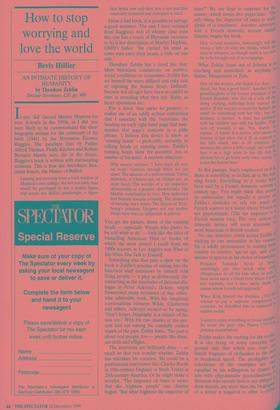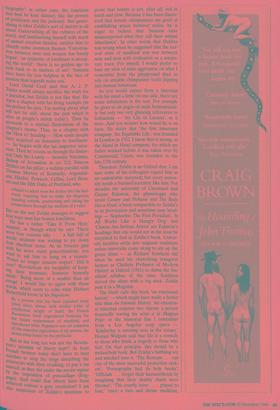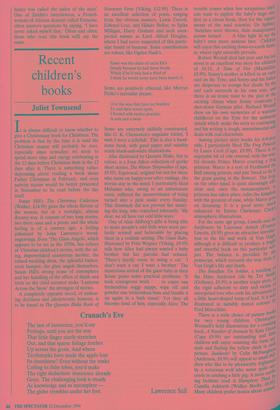How to stop worrying and love the world
Bevis Hillier
AN INTIMATE HISTORY OF HUMANITY by Theodore Zeldin Sinclair-Stevenson, £20, pp. 488 If you 'did' Gerard Manley Hopkins for your A-levels in the 1950s, as I did, you were likely to be recommended the short biography written for the centenary of his birth (1944) by the Bostonian Eleanor Ruggles. The excellent lives by Father Alfred Thomas, Paddy Kitchen and Robert Bernard Martin were far in the future. Ruggles's book is written with excruciating archness. This is how she introduces Ben- jamin Jowett, the Master of Balliol:
Leaning any morning from a back window of Hopkins's own college, the not too early riser would be privileged to see a quaint figure trip across the Balliol quadrangle, a figure that broke now and then into a trot and that constantly hummed and chirruped to itself.
From a bad book, it is possible to salvage a good sentence. The one I have retained from Ruggles's web of whimsy (and even this one has a touch of Blytonian tweeness to it) is her description of Manley Hopkins, GMH's father: 'He carried his mind as some men carry their heads, a little on one side.'
Theodore Zeldin has a mind like that. Most historians concentrate on politics, social conditions or economics. Zeldin has set himself the more difficult and risky task of exposing the human heart. Difficult, because not all ages have been as candid as ours in revealing what they felt. Risky, as heart operations are.
For a book that seeks to pioneer, it makes use of an oddly archaic convention that I associate with the Victorians: the heading on each right-hand page that sum- marises that page's contents in a pithy phrase. I believe this device is know as 'running heads' — preferable, certainly, to talking heads or running noses. Zeldin's running heads show the eccentric cast or camber of his mind. A random selection: Why slavery survives; 'I have scars all over my body'; Crevices through which we can crawl; The silences of a policewoman; Verbal midwives; A Chinese eye, an African ear, an Arab heart; The worries of a tax inspector; Abnormality as a positive characteristic; The Muslim contribution to love; How deformed feet became sexually arousing; The pleasures of burning one's boats; The Mayor of Stras- bourg's passions; Escapers are not misfits; Shops have been as influential as schools.
You get the picture. Some of the running heads — especially 'People who prefer to be told what to do' — look like the titles of bestselling American 'How to' books, of which the most absurd I recall from my 1980s sojourn in Los Angeles was What to Say When You Talk to Yourself.
Something else that puts a skew on the book is Zeldin's practice of mixing into the historical stuff interviews by himself with living people — a ploy as deliberately dis- concerting as the interludes of fictional dia- logue in Peter Ackroyd's Dickens, which flummoxed many reviewers of that other- wise admirable work. With his imaginary conversations between Wilde, Chatterton and others, Acicroyd seemed to be saying, 'Don't forget, biography is a branch of fic- tion too.' With his raw chunks of the pre- sent laid out among the carefully cooked viands of the past, Zeldin hints, The past is about real people, too — people like these, not dolls and effigies.'
The interviews are brilliantly done — so much so that you wonder whether Zeldin has mistaken his vocation. He could be a professional interviewer like Charles Booth in 19th-century England or Studs Terkel in 20th-century America. Or he might make a novelist. 'The inspector of taxes is aware that she frightens people' one chapter begins. 'But what frightens the inspector of taxes?' We are kept in suspense for the answer, which comes five pages later: 'The only thing the inspector of taxes is reallY afraid of is loneliness'. Another interview,' with a French domestic servant name° Juliette, begins the book: Only in brief moments, hesitatingly, will she reveal a little of what she thinks, which she does in whispers, as though truth is too brit' tle to be brought out of its wrappings.
What Zeldin draws out of Juliette is a.s touching and immediate as anything i° Balzac, Maupassant or Zola.
One of the women she cleans for does • • shout, but 'has a good heart'. Another is the granddaughter of the former president of the French Republic, who lies on a sofa all daY doing nothing, suffering from various ad" ments: If she was not so sorry for herself, sbe could do something with her life'; but her kindness is perfect. A third has proble1'15 with his children and with his health: `Take care of yourself, I say. Yes, doctor, he replies.' A fourth is a doctor, who shows 11° interest in her when she is ill, in contrast to her fifth client, who is all attention the moment she utters a little cough: she remeill' bers it as a high point in her life that !le allowed her to go home early once, saying, It is not the factory here.'
In this passage, finely engineered as it is, there is something as archaic as in the ralr fling heads. Everything in it could have been said by a French domestic servant 8 century ago. You might think that proves its universality; but equally it points op Zeldin's tendency to rely too much French sources in a world where France is not predominant. (The tax inspector is French woman too). The very notion oi domestic service will seem atavasitic t° most American or British readers. No one, however, could accuse Zeldin of sticking to one nationality in his soure°' He is wildly promiscuous in darting ft0°1 country to country, age to age, and aell species to species in his choice of examPles'i President Tancredo Neves of Brazil; unwittingly put into words what 111871 chimpanzees do all the time when he said, have never made a friend from whom I awl not separate, and I have never made 011 enemy whom I could not approach.'
When King Harold the Ruthless (1013.6•60) wanted to pay a supreme compliment L, someone, he described him as unmoved sudden events.
'I want to enjoy everything in broad dayligilAt,' So wrote the poet Abu Nawas (787-S1" praising masturbation.
Zeldin makes life exciting for the reade;.:' It is like being on some careering fa", ground ride that whirls you frona 134/ limelit fragment of civilisation to the 11°) at breakneck speed. The prodigality 31, eclecticism of the examples are equalled by his willingness to chance arm with epigrammatic generalisations' historian who reveals facts is not obliged r draw morals, any more than the biogralai of a writer is required to offer critt biography': in either case, the functions may best be kept distinct, like the powers of politicians and the judiciary. But gener- alising is what Zeldin's sort of history is all about. Gatecrashing all the cultures of the world, and familiarising himself with much of animal creation besides, entitles him to identify some common themes: 'Conversa- tion between men and women has barely begun% 'an epidemic of loneliness is sweep- ing the world'; 'there is no golden age to look back to in matters of sex'; 'humans have been far less helpless in the face of Passion than legends make out.' Lord David Cecil said that A. J. P. Taylor would always sacrifice the truth for a paradox; but Zeldin is not like that. He starts a chapter with his living example (in his preface he says, 'I'm writing about what Will not lie still, about the past which is alive in people's minds today'). Then he proceeds to a myriad illustrations of the chapter's theme. Thus, in a chapter with the 'How to' heading — 'How some people have acquired an immunity to loneliness 7- he begins with the tax inspector inter- Ylew. Then he croons us through the histor- ical Only the Lonely — hermits; Narcissus, Bishop of Jerusalem in AD 212; Simeon Stylites on his pillar; a sudden parallel with Thomas Merton of Kentucky; Argentini- ans, Hindus, Petrarch, Cellini, Lord Bern- ers and the fifth Duke of Portland, who
refused to admit even his doctor into his bed- room, requiring him to make his diagnosis standing outside, questioning and taking his temperature through the medium of a valet.
But on the way Zeldin manages to suggest four ways man has beaten loneliness. He has a rather 'Take It From Here' manner, as though when he says 'There Were four reasons why. . . ' a hall full of docile students was waiting to jot down four obedient notes. As he breezes past with his more outr6 generalisations, you w, ant to ask him to hang on a minute. Power no longer ensures respect.' Did it ever? 'Revolutions are incapable of keep- ing their promises, however honestly Made.' Being more of a modere than an e'ltage, I would like to agree with those Words, which seem to echo what Herbert Butterfield wrote in his Napoleon:
By a process that has been repeated many times since, always with similar tricks of intellectual sleight of hand, the French Revolution itself engendered formulas for the future enslavement of mankind, and introduced while Napoleon was yet unknown all the essential ingredients of his system, the dictatorship based on the plebiscite.
But in the long run was not the Revolu- tion's promise of liberty kept? At least French farmers today don't have to beat Marshes to stop the frogs disturbing the aristocrats with their croaking, or pay a tax instead, as they did under the ancien regime by the imposition of grenouillage (frog- gage) And could that liberty have been achieved without a gory revolution? I am also suspicious of Zeldin's keenness to prove that nature is not, after all, red in tooth and claw. Because it has been discov- ered that female chimpanzees are good at establishing peace between males, he is eager to believe that 'humans have misinterpreted what they call their animal inheritance'. In other words that Hobbes was wrong when he suggested that the nat- ural state of mankind was war between man and man with civilisation as a tempo- rary truce. For myself, I would prefer to base my view of male aggression on what I remember from the playground than to rely on amiable chimpanzee traits slipping into human behaviour.
As you would expect from a historian with his mind a little on one side, there are some imbalances in the text. For example he gives us six pages on male homosexuali- ty but only two very glancing references to lesbianism — 'my Lily of Lacuna', as it were. And you wonder how sound he is on facts. He states that 'the first insurance company, the Equitable Life', was founded in London in 1762. I know that is wrong, as the Hand in Hand company, for which my father worked before it was taken over by Commercial Union, was founded in the late 17th century.
Theodore Zeldin is an Oxford don. I am sure some of his colleagues regard him as an undesirable maverick; but every univer- sity needs a licensed eccentric like him. For decades the university of Cincinnati had Gustav Eckstein, the physiologist who wrote Camay and Hokusai and The Body Has a Head, a book comparable to Zeldin's in its provocative and sometims zany head- ings — `Sophocles: The First Freudian', 'It All Works Like a Hungry Dog' and 'Clowns Are Serious Actors' are Eckstein's headings that one would not in the least be surprised to find in Zeldin's book. Univer- sity faculties settle into stagnant traditions unless mavericks come along to stir up the green slime — as Richard Southern did when he used his electrifying inaugural lecture as Chichele Professor of Modern History at Oxford (1961) to damn the fos- silised syllabus of the time. Southern stirred the slime with a big stick. Zeldin puts it in a Magimix. The blurb calls this book 'an emotional history' — which might have made a better title than An Intimate History. An emotion- al historian conjures two visions: a person frenziedly waving his arms a la Magnus Pyke; or the immortal line I remember from a Los Angeles soap opera — 'Kimberley is emoting over in the corner.' Horace Walpole said that life is a comedy to those who think, a tragedy to those who feel. On that principle, this should be a melancholy book. But Zeldin's bubbling wit and mischief save it. 'The Romans . . . ran one of the most successful protection rack- ets'; 'Pornography had its holy books'; 'Officials . . . forgot their haemorrhoids by imagining that their shabby chairs were thrones'; 'The courtly lover . . played to lose;' once a rare and divine medicine, honey was called the saliva of the stars'. One of Zeldin's interviewees, a French- woman of African descent called Francine, often answers questions by saying, 'I have never asked myself that.' Often and often, those who read this book willl say the same.




































































 Previous page
Previous page